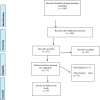A systematic review of the beneficial effects of prebiotics, probiotics, and synbiotics on ADHD
- PMID: 38623929
- PMCID: PMC11144606
- DOI: 10.1002/npr2.12437
A systematic review of the beneficial effects of prebiotics, probiotics, and synbiotics on ADHD
Abstract
Background: Children with attention deficit hyperactivity disorder (ADHD) may benefit from probiotics and prebiotics, but the effects are unclear. To determine whether probiotics and prebiotics affect children with ADHD, a systematic review was conducted.
Methods: The present systematic review analyzed cohort studies and randomized controlled trials that examined whether prebiotics and probiotics are associated with ADHD. Seven randomized controlled trials and two cohort studies met our inclusion criteria.
Results: Research on Lactobacillus rhamnosus GG (LGG) probiotic supplementation showed that children with ADHD had better emotional, physical, social, and school functioning, and a higher health-related quality of life compared to the placebo group. The studies also showed that Synbiotic 2000 reduces markers of intestinal and vascular inflammation in children with ADHD, in part through increasing SCFA levels.
Conclusion: The use of probiotics and prebiotics as adjuvants therapy in patients with ADHD is beneficial. Further studies with longer duration, including more participants and a variety of age groups, and using various evaluation techniques such as in vivo observation are required to examine the effects of prebiotics and probiotics on ADHD.
Keywords: ADHD; Synbiotic; gut microbiota; prebiotics; probiotics; short‐chain fatty acids (SCFA).
© 2024 The Authors. Neuropsychopharmacology Reports published by John Wiley & Sons Australia, Ltd on behalf of The Japanese Society of Neuropsychopharmacology.
Conflict of interest statement
The authors declare that they have no competing interests.
Figures
References
-
- Pärtty A, Kalliomäki M, Wacklin P, Salminen S, Isolauri E. A possible link between early probiotic intervention and the risk of neuropsychiatric disorders later in childhood: a randomized trial. Pediatr Res. 2015;77(6):823–828. - PubMed
-
- Furman L. What is attention‐deficit hyperactivity disorder (ADHD)? J Child Neurol. 2005;20(12):994–1002. - PubMed
-
- Härtel C, Spiegler J, Fortmann I, Astiz M, Oster H, Siller B, et al. Breastfeeding for 3 months or longer but not probiotics is associated with reduced risk for inattention/hyperactivity and conduct problems in very‐low‐birth‐weight children at early primary school age. Nutrients. 2020;12(11):3278. - PMC - PubMed
Publication types
MeSH terms
Substances
Grants and funding
LinkOut - more resources
Full Text Sources
Medical
Miscellaneous


